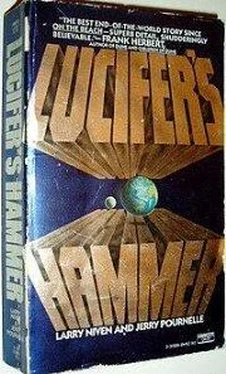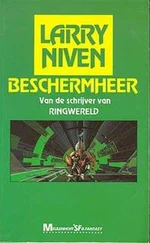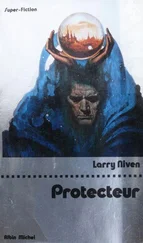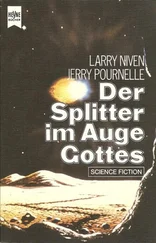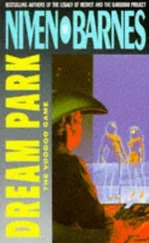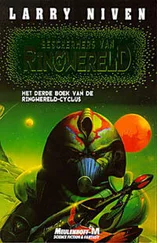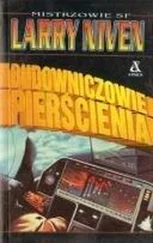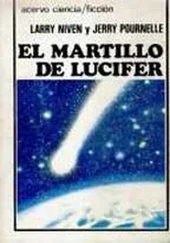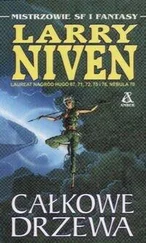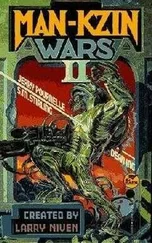Sharps smiled broadly. “Looks good, looks good. Thanks to Senator Arthur Jellison. Remember our conversation about that?”
“Right.”
“Well, he’s the man. I’d appreciate any good publicity you can give him.”
Harvey nodded. He signaled to the crew. “Let’s run it.”
“Speed,” Manuel said. Charlie was behind the camera. Mark stepped out with the board. “Sharps interview, take one.” Clack.
“Dr. Sharps,” Harvey said, “there’s been some criticism of the proposed Apollo mission to study the comet. It’s said it will be too dangerous.”
Sharps made a gesture of dismissal. “Dangerous? We’ve done it all before. A tried-and-true booster and a proven capsule. Not so many months of planning as NASA likes, but ask the men who’ll fly it. Ask the astronauts if they think it’s too dangerous.”
“Has the crew been chosen yet?”
“No — but there are forty volunteers!” Sharps grinned at the camera.
Harvey went on with his questions. They talked about the instruments the Apollo would carry. Many of them were being put together at JPL, and at Cal Tech. “Students and technicians working overtime without pay,” Sharps said. “Just to help out.”
“Without pay?” Harvey asked.
“Right. They get their regular work done, the things we have contracts for, and then put in overtime on comet packages. Without pay.”
That ought to go well, Harvey thought. He made a note to interview some of the technicians. Maybe he could find a janitor who worked overtime to help.
“It sounds like you can’t carry enough gear,” Harvey said.
“Well, we really can’t,” Sharps agreed. “Not all we’d like to carry. But what’s enough? We can take up enough to learn a lot.”
“Right. Dr. Sharps, I understand you’ve done a new plot of Hamner-Brown’s orbit. And you’ve got new photos of it.”
“Hale Observatories has the photos. We did the orbit. We’re safe in saying it will be a big comet. It’s got the largest coma ever recorded for this distance from the Sun. That means there’s a lot of ice left in the snowball. And it’s going to come quite close. First it will pass at a reasonable distance, and we’ll see a spectacular tail. Then it goes inside the orbit of Venus and most of it will vanish, although some of the tail may be visible for a while. Naked-eye visible, I might add. After that it will be too close to the Sun for us to see from here, but of course the Apollo crew will be able to get good observations from space. We won’t see it again until it gets very near Earth on its way back out. By then the sky should be filled with the tail. I’m willing to bet that tail will be visible in daytime.”
Mark Czescu whistled. Manuel didn’t glitch so Harvey knew it hadn’t got onto the tape. Harvey felt like whistling himself.
The office door opened. In came a short, rounded, vague man, about thirty years old. He had a trimmed dark beard and thick glasses. He wore a green Pendleton wool shirt, and both pockets bristled with pens and pencils of every imaginable color and nib. A pocket computer hung at his belt. “Oh — sorry, I thought you were alone.” His voice was apologetic. He began to back out.
“No, no, stay and hear this,” Sharps said. “Let me introduce Dr. Dan Forrester. His job title is computer programmer. His degrees say Ph.D. in astronomy; around here we usually call him our sane genius.”
Mark was muttering behind Harvey. “If they call him a genius in this outfit…”
Harvey nodded. He’d thought of that too.
“Dan’s been doing more recasts of Hamner-Brown’s orbit. He’s also working on the optimum launch date for our Apollo, given the limited amount of equipment we can take, and the limited amount of consumables—”
“Consumables?” Harvey asked.
“Food. Water. Air. They take mass. We can only put up so much mass, and so we trade consumables for instruments. But consumables mean time in orbit. So Dan’s working on the problem: Is it better to launch earlier, with less equipment, so they can stay longer but get less information—”
“Not information,” Forrester said. His voice was apologetic. “Sorry to interrupt—”
“No, tell us what you mean,” Harvey said.
“We’re trying to maximize information,” Forester said. “So the problem is, do we get more information by having more data about a shorter time, or less data about a longer time.”
“Oh.” Harvey nodded. “So what have you got on Hamner-Brown? How far away at its closest point?”
“Zero,” Forrester said. He didn’t crack a smile.
“Uh — you mean it’s coming down our throats?”
“I doubt it.” Now he smiled. “Zero within the limits of prediction. Which is a good half-million miles error.”
Harvey relaxed. So, he noticed, did everyone in the room, including Charlene. They took Forrester seriously here. He turned to Sharps. “Tell us, what would happen if the comet did hit us? Suppose we got unlucky.”
“You mean the head? The nucleus? Because it looks as if we might actually pass through the outer coma. Which is nothing more than gas.”
“No, I mean the head. What happens? The end of the world?”
“Oh, no. Nothing like that. Probably the end of civilization.”
There was silence in the room for a moment. Then for another. “But,” Harvey said, his voice puzzled, “Dr. Sharps, you told me that a comet, even the head, is largely foamy ice with rocks in it. And even the ice is frozen gases. That doesn’t sound dangerous.” In fact, Harvey thought, I asked to get it on the record.
“Several heads,” Dan Forrester said. “At least it looks that way. I think it’s beginning to calve already. And if it does it now, it will do it later. Probably. Maybe.”
“So it’s even less dangerous,” Harvey said.
Sharps wasn’t listening to Harvey. He rolled his eyes toward the ceiling. “Calving already?”
Forrester’s grin widened. “Ook ook.”
Then he noticed Harvey Randall again. “You asked about danger,” he said. “Let’s look at it. We have several masses, largely the same material that boils off to form the coma and the tail: fine dust, foamy frozen gases, with pockets where the really volatile stuff has been long gone, and maybe a few rocks embedded in there. Hey — ” Randall looked up at Forrester.
Forrester was grinning his cherubic smile. “That’s probably why it’s so bright already. Some of the gases are interacting. Think what we’ll see when they really get to boiling near the Sun! Ook ook.”
Sharps was getting that thoughtful, lost look again. Harvey said quickly, “Dr. Sharps—”
“Oh. Yes, certainly. What happens if it hits? Which it won’t.
Well, what makes the nucleus dangerous is that it’s big, and it’s coming fast. Enormous energies.”
“Because of the rocks?” Harvey asked. Rocks he could understand. “How big are those rocks?”
“Not very,” Forrester said. “But that’s theory—”
“Right.” Sharps was aware of the camera again. “That’s why we need the probe. We don’t know. But I’d guess the rocks are small, from the size of a baseball to the size of a small hill.”
Harvey felt relief. That couldn’t be dangerous. A small hill?
“But of course that doesn’t matter,” Sharps said. “They’ll be embedded in the frozen gases and water ice. It would all hit as several solid masses. Not as a lot of little chunks.”
Harvey paused to think that over. This film would take careful editing. “It still doesn’t sound dangerous. Even nickel-iron meteors usually burn out long before they hit the ground. In fact, in all history there’s only been one recorded case of anyone being harmed by a meteor.”
“Sure, that lady in Alabama,” Forrester said. “It got her picture in Life. Wow, that was the biggest bruise I ever saw. Wasn’t there a lawsuit? Her landlady said it was her meteor because it ended up in her basement.”
Читать дальше
